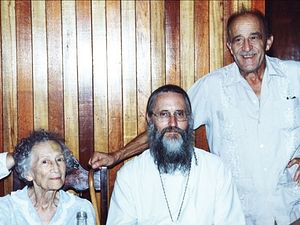 Nicholas Zakharov with Fr. Daniel McKenzie, and his mother, A. A. Porgin-Zakharova
Nicholas Zakharov with Fr. Daniel McKenzie, and his mother, A. A. Porgin-Zakharova
– Nicholas Ivanovich, tell us about your parents, please.
– My father, Ivan Sergeyevich, served in the army of the Tsar and participated in the civil war. Like many patriots, he ended up in the Crimea, from whence he came to France by sea. Papa died when I was two.
My mother, Alexandra Alexeyevna, was born in 1900, and died in 2000. She was born in Mariopol, on the shores of the Azov Sea, and was the only daughter of Priest Alexei Mikhailichenko and his matushka, Theoktista. Not only was my mother’s father a priest, but her uncle was, also. Fr. Alexei died before the revolution, but his brother was shot by the Bolsheviks.
Mother studied in the Institute of Noble Maidens, in the agriculture department. Soon after the 1917 revolution, she was arrested along with other students and teachers of the institute. Every night, several people would be taken away from her prison cell. No one who was taken away would ever return. Then it was my mother’s turn. She prepared herself for the worst, but the prison chief unexpectedly said to her, “I ate many times at your father’s table, and therefore I am giving you freedom.” Moreover, he assigned her to a Jewish family. There they told her, “Yesterday you were in power, and now we are. Keep a lock on your mouth, and don’t talk about politics.”
In 1923, mother immigrated to France, where she married Ivan Sergeyevich Zakharov. During the NEP (New Economic Policy) her mother, my grandmother, also made her way to France, and after many other moves, ended her days in Argentina.
– What was your fate in emigration? What role did the Church play in the life of those Russians who had to leave their homeland?
–In France, the emigrants existed in very difficult conditions. Fortunately, my father was able to get a job as a taxi driver. The majority of Russian doctors, engineers, and scholars cleaned toilets and mopped floors in order to earn their bread.
In 1935, we arrived in Paraguay. One of the white emmigrants, General Ivan Timofeyevich Belayev, tried to organize a “Russian outpost” there—a haven for Russian refugees. No matter where old-guard Russians would appear, the first thing they would do was to found an Orthodox Church. This is how it was in Paraguay: in 1928, in Asuncion, the nation’s capital, a church dedicated to the Protection of the Mother of God was opened.
Having lived in Asuncion seven years, we moved to the city of Encarnacion, not far from the Paraguay-Argentina border, where a church was being built dedicated to St. Nicholas the Wonder-Worker. I participated in the construction work, laying bricks. The batiushka who cared for our small community was Fr. Andrei.
In 1954, Paraguay was hit with a military coup. Following the example of many Russian inhabitants of that country, our family moved to Argentina, to the province of Villa Diamante. Emigrants were on the edge of total poverty, because their property was seized by the rebels. Nevertheless, they immediately began building a church. The rector was Nicholas Masich. Fr. Nicholas was a man with a difficult fate. He was in the Stalinist camps, lived in emigration in Germany, ended up among the interned persons (the so-called DP), who were extradited to the Soviet Union after the Second World War. Thank God, he was able to leave for Argentina.
In 1959, Fr. Nicholas moved to the U.S. and soon afterward invited our family to come. In the United States, we again began with a clean slate; first in San Francisco, and then twenty-five kilometers from there, in Burlingame. There, under Fr. Nicholas’ direction, the Russian emigrants built a beautiful church with a golden dome. My contribution to the construction is marked by two grammatas from the ruling hierarch of Western America and San Francisco, Russian Church Abroad, Archbishop Antony (Medvedev; 1908–2000). I lived in the U.S. from 1959 to 1984.
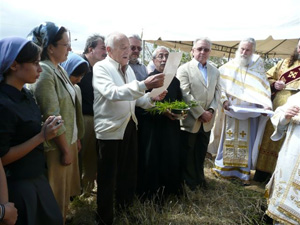 Placing the first stone in the foundation of the Vladimir Mother of God Church.
Placing the first stone in the foundation of the Vladimir Mother of God Church.
– There were personal motives behind that move. Costa Rica is probably the most peaceful country in Latin America. It has everything a person could dream of. Only an Orthodox church is needed to make a Russian completely satisfied there.
In the mid 1980’s, there were practically none of our countrymen there. I invited my father and other friends to move to this earthly paradise. I brought my mother after them.
– How did your community come into being?
– In 1994, I went to Miami to meet with Archpriest Daniel McKenzie (ROCOR), who I asked to take on the pastoral care of the Russian Orthodox flock in Costa Rica. Batiushka agreed, and soon flew over. I took responsibility for all his financial expenditures connected with the trip. Fr. Daniel served the Liturgy in my home in San Vito, not far from the border of Panama (I think that this was the first Orthodox service in Costa Rica). From San Vito we headed to San Jose, where Fr. Daniel also served the Liturgy in a private home. I stood near the entrance and explained to those who came how to cross oneself properly, and how to receive a blessing [from a priest].
Fr. Daniel is a very good priest, respected by everyone in the community. His ancestry is Irish; he is married to a Russian woman, and is the rector of a church in Miami, dedicated to Equal-to-the-Apostles, St. Vladimir.
– Why did the community choose the Vladimir Mother of God as its patroness?
– Originally the community was named after the Protection of the Mother of God. I will explain why. The first refugees that came to France from Russia after 1917 looked like living skeletons. Many of them had tuberculosis and suffered from hunger. My older sister, Olga, died when she was one year old. I was born very weak, with tuberculosis. The doctor told my mother that I would not survive. Then she started praying before the icon of the Protection of the Mother of God to pray to Her Son to save me. One day, when I was two years old, I told my mother that a man had come to me with large wings. Mama took me to the doctor without delay. The doctor could not believe that he was seeing a boy whom he only recently seen dying. I recovered completely. As a remembrance of my mother’s prayers, I dedicated the community to the Protection of the Mother of God. Later it changed the name.
– How many people are in the community?
– Sixty people actively participate in parish life—people who emigrated from the former U.S.S.R. over the last thirty years, Costa Ricans, and members of other nationalities. On Pascha there are up to 100 people. I reckon that there were eighty-five baptisms in our community.
–Who now pastors the Costa Rican Orthodox?
– In 1994, three or four months after his first visit, Archpriest Daniel visited us again. Certain Russians helped me buy a ticket for our pastor, thanks to which he visited Costa Rica regularly.
In 2004–2006, Archpriest George Salatnikov, a ROCOR priest from Russia, served in Costa Rica. Unfortunately, he was not able to establish a rapport with the community.
Hieromonk Nicholas (Perekrestov) came a couple of times from New York. He serves in the Cathedral of the Mother of God of the Sign, in the residence of the Holy Synod of the Russian Church Abroad in Manhattan.
Later the community was again pastored by Fr. Daniel. With his support, several parishioners have entered the summer sessions for church singing in Holy Trinity Seminary in Jordanville (U.S.A.). Now we can boast our own professional choir.
Fr. Daniel played an important role in preparing a young priest, Fr. Rodion Aragon, for service in the Church. Fr. Rodion came to Orthodoxy himself, and was one of the most active parishioners. Having left his work in the field of music, he entered Holy Trinity Seminary in 2008. After a few months he was ordained a deacon, and in January of 2009, he was ordained a priest. In June of the same year, he returned from the U.S. to Costa Rica.
Fr. Rodion and his matushka Elena breathed new life into the community. They built a chapel next to their house. Services were conducted in Russian [Slavonic] and Spanish. But the Lord ordained that Fr. Rodion would not serve as our priest very long. He was stricken by a fatal disease, and suffered very much. On January 11, 2010, Priest Rodion reposed. We will not soon overcome the pain from that loss.
– When did construction begin on the Church?
– In April 2006, our community acquired a parcel of land 2,500 meters in size, located in northwest San Jose, ten kilometers from the center of town. We plan to build a church and a building for the refectory, Sunday school, and library there.
In January 2008, Bishop Gabriel (Chemodakov) of Manhattan (at the time, secretary of the Synod of Hierarchs of the Russian Orthodox Church Abroad), Archpriest Daniel McKenzie, and the rector of the Moscow Patriarchate Church of the Protection in Panama, Archpriest Alexander Gorbunov, placed the first stone. The Synod decided to dedicate the church to the Vladimir icon of the Mother of God. A capsule with a particle of the relics of St. Andrei Bogoliubsky was placed in the foundation. His name is inseparably bound with the Vladimir icon.
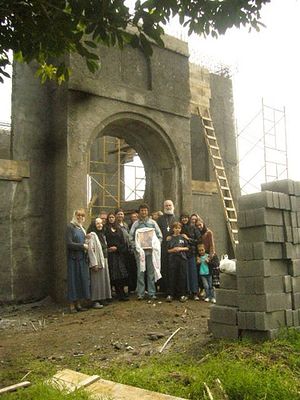 Parishioners at the church construction site.
Parishioners at the church construction site.
– How do you view the signing of the Act of canonical communion between the Moscow Patriarchate and the RussianChurch Abroad?
– I consider the Act to be a positive event. The Lord Himself brought the two parts of our Church together in unity.
– What did the “Days of Russia in Costa Rica” mean to the Vladimir Mother of God community?
– The “Days of Russia” evoked no small resonance in the Costa Rican community. The press thoroughly covered the events connected with it. The Sretensky Monastery Choir made a particular impression on Costa Ricans. Orthodox believers received enormous spiritual joy at the moleben and blessing of the waters that was served by the current Patriarch, His Holiness Kirill of Moscow and All Russia before the miracle-working “Reigning” icon of the Mother of God. I specially came to the capital in order to be at that service.
Miguel Palacio spoke with Nicholas Zakharov

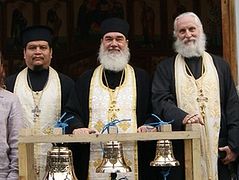
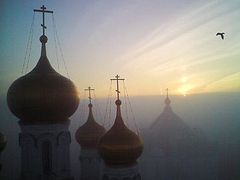
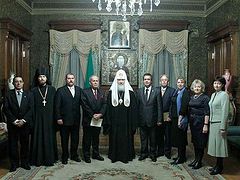
Please email in Russian .
Neil Korpal
My email is terohina@yahoo.com
Thank you.
Tatiana Erohina
I'm currently living here in Costa Rica ( I'm originally from Miami,Florida) and for the past few months, I've been reading a lot about Eastern Orthodox Christianity. I would really like to visit your church and learn more about your faith.
How do I get in contact with the community in San Jose?
Oн que hay una Iglesia Ortodoxa Rusa en Panamб, cerca de la frontera con Costa Rica, en un pueblo que se llama La Concepciуn. Este pueblo estб ubicado en la provincia de Chiriquн. їEs cierto? Le pregunto porque mi hija vive en David, la capital de la provincia de Chiriquн, y le gustarнa asistir. їQuiйn me puede decir mбs de йsto?
Gracias,
Serafнn Williams